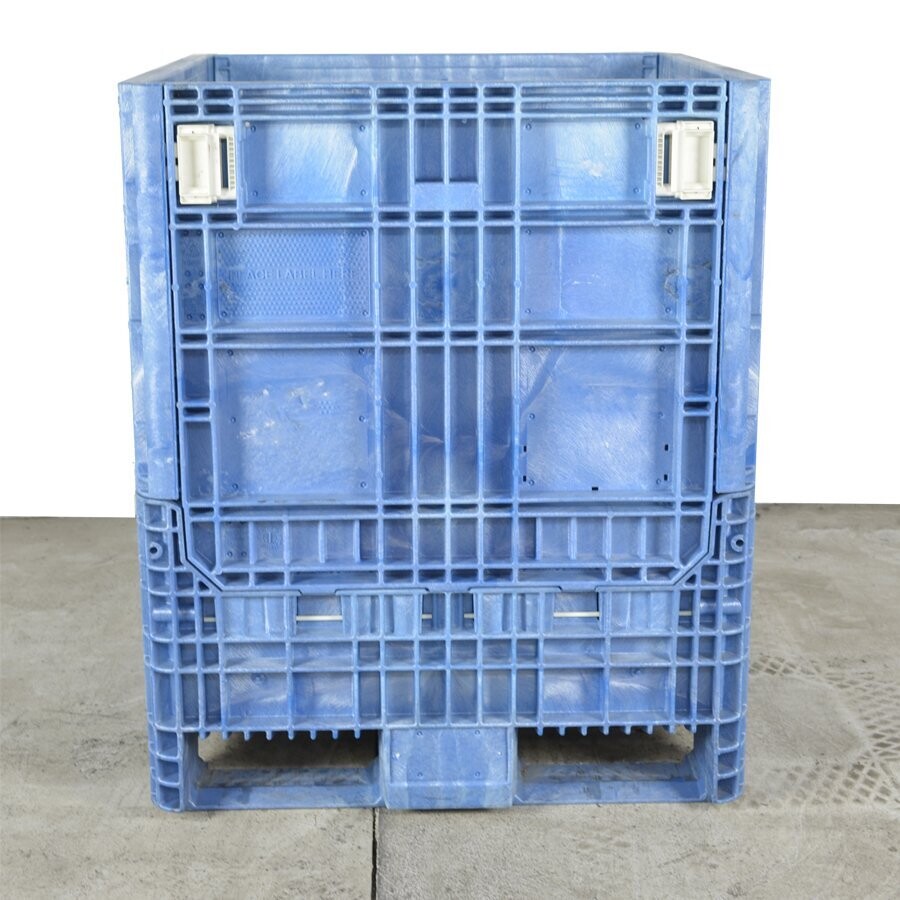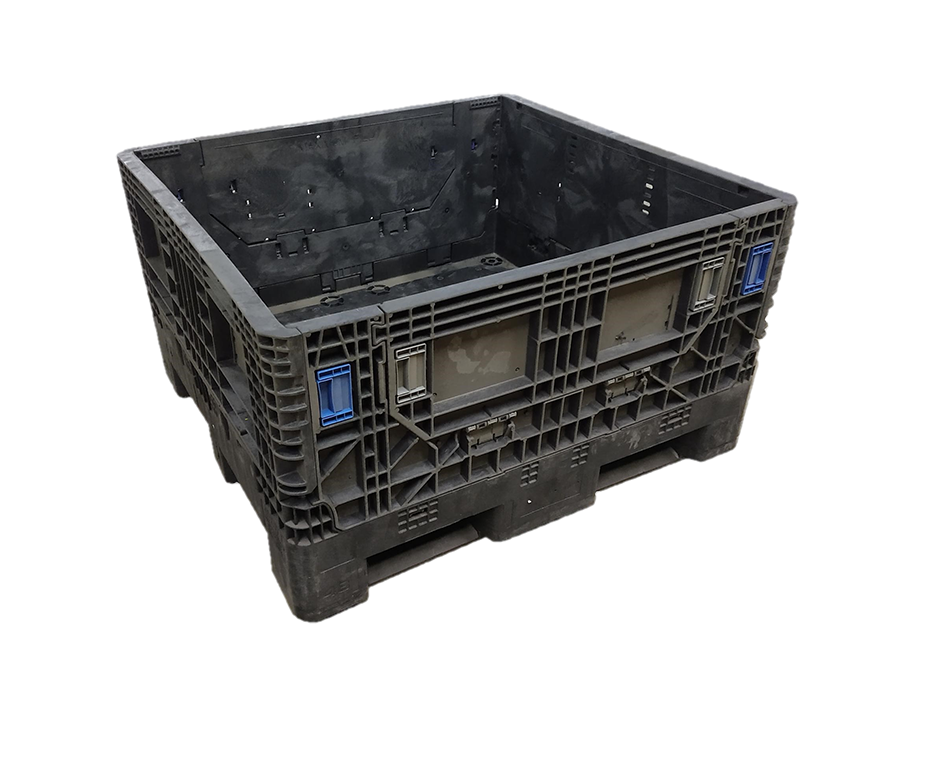Why refurbished bulk containers and used collapsible bulk containers are sustainable assets
Wiki Article
The Ultimate Overview to Picking the Right Bulk Containers for Your Service Demands
Selecting the ideal bulk containers is critical for any service that depends on efficient logistics. Various kinds of containers exist, each developed for specific materials and applications. Aspects such as size, product compatibility, and regulatory requirements play a substantial function in this decision-making procedure. Recognizing these components can result in improved operational performance. Several services neglect vital aspects that could enhance their overall efficiency and sustainability. What are these factors to consider?Understanding Various Kinds Of Mass Containers
Mass containers work as important devices for companies seeking effective storage and transport services. These containers come in numerous types, each designed to satisfy specific operational needs. One common kind is the intermediate bulk container (IBC), which is perfect for granulated and liquid materials, using a balance of capacity and maneuverability. An additional popular option is the mass bag, or FIBC, ideal for completely dry, flowable items. These versatile containers are light-weight and can be easily transported and kept. For much heavier materials, stiff mass containers are typically employed, providing durability and stability for risk-free handling. Additionally, there are customized containers customized for harmful materials, ensuring conformity with safety and security regulations. Recognizing the unique qualities of these bulk container types allows organizations to make enlightened decisions that optimize logistics and minimize prices. By picking the appropriate container, firms can boost their operational efficiency and simplify their supply chain processes.Secret Material Factors To Consider for Mass Containers
When picking bulk containers, it is necessary to consider the materials made use of in their building. Variables such as longevity, chemical, and toughness compatibility play a crucial duty in making sure the containers meet certain operational demands. Furthermore, weight and transportability problems can affect both performance and transport logistics.Material Toughness and Stamina
Longevity and strength are crucial aspects in choosing materials for mass containers, as they straight affect the container's ability to withstand various environmental problems and taking care of procedures. Materials such as high-density polyethylene (HDPE), polypropylene, and stainless-steel are typically favored for their durable homes, offering resistance to impact, abrasion, and temperature variations. The option of material likewise influences the general life-span of the container; more powerful materials usually cause less regular replacements, leading to cost savings with time. Furthermore, the weight of the material can affect delivery prices and ease of handling. Businesses need to consider their details functional atmospheres and the potential for damage to guarantee peak toughness and strength in their bulk container selection.Chemical Compatibility Factors
Comprehending chemical compatibility is crucial for choosing bulk containers, as the products used have to stand up to the particular compounds they will hold. Various aspects influence compatibility, consisting of the chemical nature of the contents, temperature level, and period of storage space. Harsh chemicals might need containers made from stainless steel or specialized plastics that stand up to deterioration. Furthermore, responsive compounds can create heat or gases, demanding vented or pressure-rated containers. The selection of container material, whether polyethylene, metal, or polycarbonate, should straighten with the chemical homes of the kept substances to protect against violations or leakages. Ultimately, a complete assessment of these compatibility elements assures risk-free handling and storage space, securing both workers and the environment while maintaining item integrity.Weight and Portability Worries
Selecting mass containers entails not only reviewing chemical compatibility yet additionally considering weight and portability. Businesses need to examine the convenience of handling and transport to enhance performance. Lightweight materials like high-density polyethylene (HDPE) or light weight aluminum can promote easier motion and decrease delivery expenses. Alternatively, larger containers may offer boosted longevity but can prevent movement, particularly in settings requiring regular moving. In addition, the layout of the container should permit convenient training and stacking, ensuring ergonomic security for workers. Companies ought to additionally consider the facilities offered for transportation; as an example, containers compatible with forklifts or pallet jacks can streamline operations. Ultimately, the appropriate balance between weight and portability straight affects functional efficiency and cost efficiency.Sizing Your Bulk Containers for Optimum Performance
When sizing bulk containers, businesses should very carefully assess the measurements required to fit their particular products. Additionally, weight capability is a vital factor that affects performance and safety during transportation and storage. Effective sizing not only optimizes area however likewise optimizes operational workflows.Identifying Container Dimensions
Selecting the best dimensions for bulk containers is crucial for making the most of efficiency in storage space and transport. Services should evaluate their details requirements, taking into consideration elements such as available area, the nature of the products being stored, and the approaches of transportation made use of. Exact measurements ensure that containers fit ideally in stockrooms and lorries, decreasing squandered area and decreasing managing time. Requirement sizes can provide convenience, you could try this out yet custom-made measurements could be essential for unique needs or to suit certain products. Additionally, it is necessary to review piling capabilities and access, as these factors affect overall operational efficiency. Ultimately, the ideal dimensions cause enhanced company and streamlined logistics, profiting the overall performance of business.Weight Ability Considerations
Recognizing weight ability is essential for services aiming to maximize their bulk container efficiency. The weight ability of a container directly affects storage space capabilities, transport logistics, and total operational expenses. Picking containers with the ideal weight restrictions ensures that companies can securely keep and transport their products without taking the chance of damages or compliance problems. Overwhelming containers can bring about structural failings, while underutilizing capability lead to lost sources. When picking containers, it is important for services to analyze their product weights and take into consideration any regulative requirements. Furthermore, elements such as the sort of product, planned use, and ecological problems should likewise influence weight ability decisions. By assessing these aspects, services can boost effectiveness and ensure a structured supply chain.Regulatory Compliance and Safety Criteria

Regulative compliance and safety and security criteria play a vital function in the choice of mass containers for services. Organizations should ensure that their containers satisfy different regulations set by neighborhood, national, and global authorities. These requirements typically concern material safety and security, architectural stability, and appropriate labeling, which aid protect against accidents and guarantee the secure transport of goods.
In addition, adherence to industry-specific standards, such as those from the Fda (FDA) or the Occupational Security and Wellness Management (OSHA), is important for companies managing hazardous materials or food. Non-compliance can lead to penalties, lawful concerns, or damage to an organization's credibility.
Services ought to also consider the container's compatibility with the products being kept or transported to prevent contamination or chain reaction (refurbished bulk containers). To summarize, understanding and applying regulatory compliance and safety and security standards is essential for the reliable and responsible use bulk containers
Sustainability Alternatives for Eco-Friendly Bulk Containers

Firms are also exploring alternatives made from recycled products, which not only conserve resources yet also support the reusing sector. Developments in layout permit for lighter containers that require less energy to transportation, further improving sustainability. By incorporating these eco-friendly bulk container options, companies can demonstrate their dedication to environmental stewardship while meeting consumer need for sustainable techniques. This change not just assists the earth however can also improve brand track record and client commitment.
Cost-Effectiveness and Budgeting for Mass Containers
great post to read While lots of services focus on sustainability, cost-effectiveness stays an important factor when picking mass containers. Organizations has to analyze the preliminary acquisition price, along with long-term functional costs, to assure monetary feasibility. Variables such as maintenance, longevity, and reusability play a significant function in establishing total costs.Buying top quality containers might yield greater in advance prices but can result in cost savings with decreased substitute rates and lowered waste. Additionally, organizations ought to consider transport expenses and storage space performance, as these can affect the overall budget.

Frequently Asked Questions
Exactly how Do I Determine the Right Container for Hazardous Products?
To identify the ideal container for hazardous materials, one must examine compatibility with the substance, think about the container's material, check for regulatory compliance, and examine ability and safety and security functions to assure correct handling and storage space.Can Mass Containers Be Personalized for Particular Products?
Yes, bulk containers can be tailored for details items. refurbished bulk containers. Different functions, such as layout, product, and dimension, can be tailored to fulfill distinct demands, guaranteeing ideal security and efficiency for moving and keeping various productsWhat Is the Typical Lifespan of Various Bulk Container Types?
The ordinary life expectancy of bulk container kinds varies; plastic containers last 5-10 years, steel containers 10-20 years, and wood containers generally last 3-7 years, depending upon usage, upkeep, and environmental problems.How Should I Clean and Maintain Mass Containers?
To clean up and keep bulk containers, one need to regularly inspect for damages, remove residue, laundry with suitable detergents, rinse completely, and guarantee proper drying before storage space. Following producer standards improves longevity and safety and security throughout usage.Exist Rental Alternatives for Mass Containers Available?
Yes, countless companies provide rental options for mass containers, supplying versatility for services. These leasings can suit various demands, allowing business to take care of stock efficiently without the dedication of buying containers outright.Durability and toughness are important elements in choosing products for mass containers, as they directly affect the container's ability to endure different ecological conditions and dealing with procedures. Understanding chemical compatibility is necessary for picking bulk containers, as the products utilized need to withstand the specific substances they will certainly hold. Recognizing weight capacity is vital for services intending to maximize their bulk container performance. Regulatory compliance and security criteria play an important role in the option of mass containers for services. While several companies concentrate on sustainability, cost-effectiveness remains an important factor when choosing my explanation mass containers.
Report this wiki page